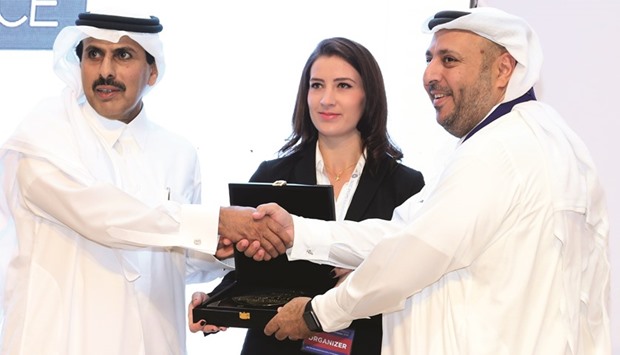Insurance premiums in Qatar experienced a 33.5% growth to reach more than QR11bn in 2015, according to HE the Central Bank Governor Sheikh Abdullah bin Saud al-Thani, citing the “remarkable development” of the country’s insurance industry in the past decade.
At the same time, Sheikh Abdullah stressed that the financial position of all national insurance companies in the country increased by QR9bn in 2015 or a 25% growth compared to 2014.
“This reflects great activities in the insurance sector and insurers stand as a key factor in supporting the financial system of the country. These include nine national companies, five of which are listed at the Qatar Stock Exchange, while the others are working in Islamic insurance or the takaful industry,” he said.
The Qatar Central Bank governor was addressing the opening session of the 49th International Association of Engineering Insurers (IMIA) Conference, which will run until tomorrow at the Marsa Malaz Kempinski in Doha.
Sheikh Abdullah said: “We are proud to have the IMIA conference in Qatar for the first time in the region at a time when the global economy and the financial sector are facing various challenges. This requires us to conduct researches and find solutions that should reduce the negative impacts on the financial sector.
“The development of the insurance sector is on the top of the priorities of the QCB, taking into consideration its importance and role in supporting the economy. The QCB is working according to a comprehensive strategic plan as per the Qatar National Vision 2030.”
At the global level, IMIA chairman Oscar Tresceno said the IMIA has collected $8bn worth of insurance premium worldwide for engineering insurance in 2015. “On insurance claims, the IMIA pays $13mn in losses every day or half a million every hour. This is the contribution to the economy,” he added.
Sheikh Nasser bin Ali al-Thani, chairman of Qatar General Insurance and Reinsurance Company (QGIRCO), said: “We are proud to support this conference because the insurance sector is an important contributor in the national economy and engineering insurance specifically supports the challenging projects that are part of the Qatar National Vision 2030.
“QGIRCO has a long experience and deep knowledge in this field, and today’s conference is a clear indication of the role QGIRCO is playing for the economic development of the country.”
Speaking to reporters during a press conference after the opening ceremony, IMIA general secretary Dr Hans Mahrla said: “Qatar would be good, attractive market because of the huge volume of investments. Every insurer would be keen on being here and doing business but when too much insurance comes in, rates go down and conditions become wider and wider, which means the results would be negative after five to 10 years.”
Ghazi Kamel Abu Nahl, Group CEO, Qatar General Group, added that economic growth and government policy have elevated Qatar’s status in the international market.
Venturing abroad presents challenges
Despite the impact of low oil prices, the resilience of Qatar’s economy has helped push the growth of insurance premiums in the country, said Ghazi Kamel Abu Nahl, Group CEO, Qatar General Group. “The insurance industry is a reflection of the economy. Qatar’s economy has recovered and insurance premium has gone up. But more than insurance premium, what is important is that it has to be competitive and technically profitable at the same time,” he told Gulf Times when asked if low oil prices and streamlining measures in the private and public sector have affected insurers in Qatar. “As the central bank governor said, Qatar’s insurance industry grew by 33.5% in 2015. That is okay. But if the economy in 2016 is weaker, then I think it will show some drop,” he noted. Asked about the challenges in the industry, Nahl said the challenge for Qatar insurers is to venture abroad “once the maximum capacity is absorbed within the local market”. “The challenge here in Qatar is more technicality, more professionality and more encouragement from the regulator so that insurance companies will absorb the capacity and then go outside,” he said. Compared to other countries, Nahl said Qatar “is better”, but added that “there is still room for growth.”

HE the Central Bank Governor Sheikh Abdullah bin Saud al-Thani receives a token of appreciation from Qatar General Insurance and Reinsurance Company chairman Sheikh Nasser bin Ali al-Thani during the opening of the 49th International Association of Engineering Insurers (IMIA) Conference yesterday. PICTURE: Jayan Orma

